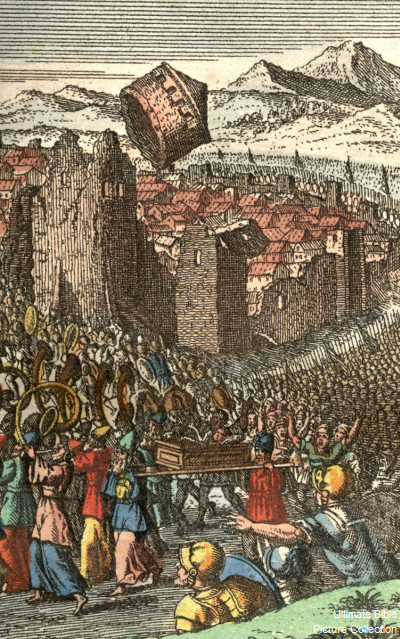“In Prayer Before God”

2 Samuel 18: 5-17, 29-33 (18:33) – August 11, 2024
The summary of a popular novel or a made-for-TV movie might be “An aging father grieves over the sudden death of his beloved son.” How often do we see this sort of sad headline broadcast by the media, or plastered on the covers of magazines in grocery stores? We can all feel for the affected family, or the grieving friends and relatives.
We all know grief. We all have experienced it, too. Some people are not even sure whether they ought to be grieving, but their insides say they very much ought to! “Grief is tremendous suffering and deep sadness. Grief could come after the death of a loved one. It could begin after the death of a pet. Grief could happen when our best friend moves to another city, and we have to say goodbye. We can’t get over grief – deep sadness- the way we get over a cold.” [1]
This is what our Bible reading from 2 Samuel is all about today. The aging King David is grieving for his son – his most favorite son, Absalom. But, let’s back up a little, in this very sad tale. Absalom must have been a good-looking, charismatic guy, and a compelling leader, too. He thought very well of himself, and was itching to take over the kingdom from his father, King David. He certainly convinced a lot of people in Israel to get on his side, enough to mount a rebellion – an army to overthrow his father’s kingdom!
This narrative is lengthy, and I don’t want to read it all to you. Let me give you the short-short version. Absalom was one of many children of King David. David had many wives, and they all were fruitful. David ended up with several dozen children from wives and concubines. Absalom was David’s favorite son. Sadly, and shocking to think – considering David was his father, Absalom was not a kind and virtuous person. By Biblical report, he was narcissistic, stuck up, and thought way too much of himself.
David’s many children had a great deal of drama going on between them. You can read all about this unsavory drama yourselves, in 2 Samuel. Still, King David loved Absalom very much, even though Absalom raised an army to overthrow his father and become king of Israel himself. Sadly, things did not work out well for Absalom. “In this reading we see David issuing orders, trying to ensure that whatever happens in the upcoming battle between his supporters and the rebellion led by Absalom, that Absalom is to be spared. Ultimately, today’s passage ends with David learning that Absalom had been killed and the King is heartbroken.” [2]
What do we do when we face such heartache over a loss that is not really a loss? What do we do when we have what is called ambiguous loss and grief? Certain kinds of loss and grief are frequently not even recognized as grief. Instead, it’s marked by uncertainty – the absence of closure, the murkiness surrounding what has been lost, or whether it’s truly gone.
Look at the awful situation with Absalom, who was treating his father King David so poorly. The young man was even leading a rebellion against his father! And, King David still loved his son very much, even when Absalom died. David loved and grieved so much!
Some of these complicated and ambiguous situations are so difficult for the people and families to respond to. And, how should you and I respond to such pain, hurt and suffering? Our worship service each week gives us a road map on a caring way to respond even to ambiguous and puzzling situations. We can pray. We can come before God.
Our commentator reflects that “Few simple solutions exist to the complex problems that plague our lives, whether we’re talking about war among nations, conflicts within families, or battles being waged in individual hearts. And yet, no matter the enormity of the challenges we face, grace abounds again and again.” [3]
It is part of a loving and grace-filled response to lift our neighbors, our loved ones and their complicated situations to the Lord. A good place to begin is to acknowledge and validate the emotions surrounding the situation. There is real grieving going on! Even though the grief inside might not be acknowledged, or might be hidden or difficult to see, there are several responses possible. Let us choose the loving and caring response by praying for these friends without judgement. Let us cover the difficult or painful situation in prayer.
We realize that God knew David’s difficult situation, with Absalom and his total disrespect and rebellion of his father. We feel so deeply for King David, still loving his favorite son despite everything crashing down around his ears.
Even though our friends and loved ones may be in distress or even in despair, “The prayers of the people remind us that when we don’t know what to do or we are afraid to acknowledge the suffering around us, we begin with prayer; and not just individual prayer—corporate prayer. We don’t have to know the details of our neighbors’ struggles [and pain] to gather together and offer one another grace through prayer.” [4]
We can do that alone, in prayer before God, certainly! What is more, we can gather together as a congregation, as friends in Christ. Let us take the opportunity to lift up each other as we grieve, as we go through all kinds of losses. What a loving way to extend comfort and encouragement! And, we can bring all of these prayers before our loving, caring, compassionate God. What a balm for the heart and soul, as we know God cares for each one of us.
(Suggestion: visit me at my other blogs: matterofprayer: A Year of Everyday Prayers. and A Year of Being Kind . Thanks!
[1] https://www.umcdiscipleship.org/worship-planning/worship-with-rejoicing/twelfth-sunday-after-pentecost-year-b-lectionary-planning-notes/twelfth-sunday-after-pentecost-year-b-childrens-message
[2] https://www.churchofscotland.org.uk/worship/weekly-worship/monthly/2024-august/sunday-11-august-2024-twelfth-sunday-after-pentecost-year-b
[3] https://www.umcdiscipleship.org/worship-planning/worship-with-rejoicing/twelfth-sunday-after-pentecost-year-b-lectionary-planning-notes
[4] https://www.umcdiscipleship.org/worship-planning/worship-with-rejoicing/twelfth-sunday-after-pentecost-year-b-lectionary-planning-notes


